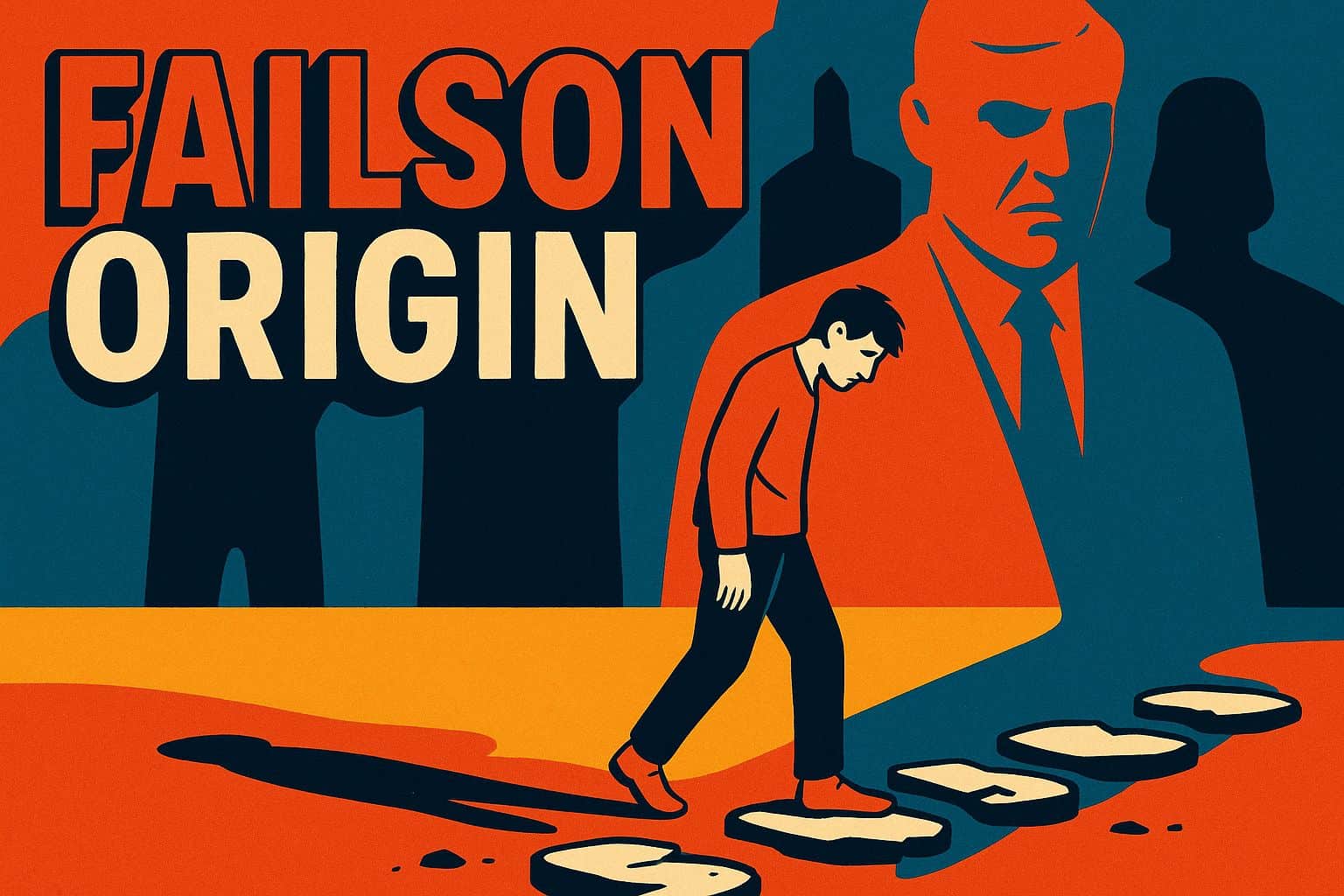You’ve probably heard someone called a “failson” online and wondered where this brutal term came from. The failson origin traces back to internet forums in the early 2010s, but it was the podcast Chapo Trap House that turned it into the perfect weapon for roasting privileged rich kids who can’t live up to their family’s wealth and status.
This deep dive will show you how a simple insult evolved into one of the internet’s most cutting ways to call out nepotism, entitlement, and the spectacular failures of people like Donald Trump Jr.
and other trust fund disasters. Get ready to learn why this term hits so hard.
Key Takeaways
“Failson” originated on Something Awful forums in 2012 but gained mainstream popularity through the podcast Chapo Trap House in the mid-2010s.
The term describes privileged men who coast on family wealth and connections yet fail spectacularly despite having every advantage.
Donald Trump Jr. exemplifies the failson archetype, with his book “Triggered” boosted by $94,800 in RNC purchases rather than organic sales.
“Failson” differs from “nepo baby” by emphasizing personal incompetence and arrogance rather than just inherited career opportunities and connections.
The term evolved from internet slang into mainstream political commentary, becoming a weapon for criticizing nepotism and inherited privilege.
Table of Contents
What Does “Failson” Mean?

A “failson” describes a privileged young man who coasts through life on family money and connections, yet still manages to mess things up spectacularly. This internet slang captures the essence of wealthy kids who inherit everything but achieve nothing meaningful on their own merit.
What is the definition and main traits of “failson”?

A failson is an adult son who appears unsuccessful or disappointing, especially from wealthy or powerful families. These men burn through their inheritance while jumping between hobbies and jobs without commitment.
They abandon goals quickly and neglect basic responsibilities, creating a pattern of failure despite having every advantage.
Failsons display several key traits that make them easy to spot. Entitlement drives their behavior, paired with obvious incompetence and arrogance that blinds them to their shortcomings.
They lack empathy and think rules don’t apply to them. Many hold meaningless positions in family businesses, like “vice-president of special projects,” or pursue art careers without talent.
Their romantic and sexual failures add to their inadequacy, while they express anger and resentment whenever parental assistance or connections disappear. Some modern Failsons become professional online influencers, using their family wealth to buy followers and attention they can’t earn through merit.
How is “failson” related to terms like “nepo baby” and “trustafarian”?

The failson sits in a crowded field of privilege-shaming terms, each targeting different aspects of wealth and entitlement.
| Term | Focus | Key Difference from Failson | Overlap Areas |
|---|---|---|---|
| Failson | Personal failure despite wealth | Emphasizes incompetence and arrogance | Base term for comparison |
| Nepo Baby | Inherited opportunities | Highlights nepotism without requiring failure | Both target privileged backgrounds |
| Trustafarian | Countercultural lifestyle choices | Centers on lifestyle posturing, not incompetence | Both describe wealthy offspring |
| Aristocratic Bimbo | Female equivalent with less stigma | Carries gentler connotations than failson | Both target privileged children |
| Dilettante | Superficial interest in arts or culture | Less harsh, more academic tone | Both imply lack of serious achievement |
Failson overlaps with nepo baby since both target beneficiaries of family wealth and connections. Nepo babies get opportunities through family ties, while failsons squander those same advantages through incompetence. Both terms call out inherited privilege, but failson adds the sting of personal mediocrity.
Trustafarian shares the wealthy parent component but diverges in its target behavior. Trust fund kids adopting bohemian lifestyles get the “trustafarian label”, while failsons earn their title through arrogance and failure. Trustafarians at least attempt countercultural authenticity; failsons typically embrace their privilege while failing spectacularly.
Failson stands apart by focusing on personal inadequacy rather than just inherited opportunity. Nepo babies might succeed despite their advantages, but failsons manage to fail even with every advantage. This distinction makes failson particularly cutting as social commentary.
The term carries more venom than its female counterparts like “aristocratic bimbo” or “dilettante”. These alternatives suggest harmless incompetence, while failson implies active entitlement and arrogance. Male privilege amplifies the criticism, making failson a sharper weapon in online discourse.
Wealthy parents and good family relationships create the foundation for all these terms. The typical failson maintains close ties with his family, unlike rebellious trust fund kids who might reject their background. This family harmony often triggers jealousy among those struggling financially, making the failson label even more potent.
Each term serves different purposes in calling out privilege. Nepo baby works for successful but undeserving individuals, trustafarian fits lifestyle posers, and failson targets the incompetent and arrogant. The overlap creates a comprehensive vocabulary for criticizing different flavors of inherited advantage.
The Origins of “Failson”

The term “failson” first emerged from the depths of internet culture, specifically gaining traction through left-leaning political podcasts and online forums. Chapo Trap House, a popular political comedy podcast, helped cement the word into internet vocabulary by using it to mock wealthy, underachieving men who coast on family money and connections.
Where did “failson” first appear online?

The earliest notable use of “failson” appeared on Something Awful in a subthread created on November 20, 2012, just before Thanksgiving. Message boards like Reddit, 4Chan, and Something Awful served as the birthplace for this cutting internet slang.
Early Twitter usage focused on family obligation failures, such as forgetting Mother’s Day or missing important family events.
The internet gave us a perfect word for rich kids who can’t measure up to their parents’ success.
Between 2010 and 2015, the term gained serious traction across online communities. Bloggers and internet users embraced “failson” as a way to mock wealthy inheritance recipients who failed to live up to expectations.
Initial usage centered around internet communities with a strong appetite for satirical content, particularly targeting those who benefited from wealth inheritance but lacked merit-based achievements in a supposedly meritocratic society.
How did the podcast Chapo Trap House popularize “failson”?

While “failson” existed in obscure corners of the internet, Chapo Trap House transformed it into a mainstream political weapon. Will Menaker of the podcast gets credit for coining the term, according to a 2016 New Yorker article.
The leftist comedy show used “failson” to mock wealthy, incompetent men who coasted on family connections.
Chapo Trap House’s audience helped spread the term across social media platforms and political discussions. The podcast hosts wielded “failson” to critique figures like Jared Kushner and other Trump administration officials who seemed to fail upward through nepotism.
Merriam-Webster and Dictionary.com both credit Chapo Trap House with elevating the term’s visibility. The show’s rise in the mid-2010s coincided perfectly with growing anger about meritocracy and privilege, making “failson” the perfect insult for calling out entitled rich kids who never earned their positions.
Cultural Context and Usage

The term “failson” cuts deep because it exposes the gap between privilege and performance—calling out wealthy kids who coast on family money while failing at basic life skills. This insult works perfectly for roasting entitled rich guys who stumble through careers, relationships, and responsibilities despite having every advantage handed to them.
How is “failson” connected to privilege and wealth?

Failson” cuts straight to the heart of inherited privilege and unearned wealth. These individuals ride their family’s coattails to success, often claiming credit for achievements they never earned.
Donald Trump serves as the perfect example, inheriting roughly $500 million from his father while marketing himself as a self-made businessman. Rudy Giuliani’s son, Andrew Giuliani, follows this same pattern, leveraging his father’s political connections to secure positions he likely couldn’t obtain on merit alone.
Private schools play a crucial role in maintaining this system, carefully managing privileged offspring and preparing them for elite circles. Failsons thrive in these environments despite lacking genuine qualifications or talent.
Their success highlights the breakdown of meritocracy in America, where family wealth matters more than actual ability. This phenomenon directly contributes to our widening wealth gap, as unqualified individuals occupy powerful positions simply because of their last names.
Estate taxes could help reduce their influence, but current policies allow these dynasties to continue unchecked.
In what ways is “failson” used as an insult or humor?

People use “failson” as a sharp insult to mock privileged young men who lack basic skills or achievements. The term cuts deep because it highlights the gap between someone’s advantages and their actual accomplishments.
Online communities deploy this roast to call out entitled behavior, especially on platforms where incels and other groups gather to complain about their failures. The humor works because it exposes how some men with every advantage still manage to mess things up spectacularly.
Social media users love throwing “failson” around for self-deprecating jokes too. Many guys embrace the label to poke fun at their own privileged upbringing or lack of direction. The term creates comedy gold because failsons often stay oblivious to their shortcomings, making them perfect targets for memes and viral content.
This satirical approach helps people process frustration with nepotism and unearned success while keeping things light and entertaining. The term’s popularity shows how internet culture transforms class criticism into digestible humor that resonates across different online spaces.
Evolution of the Term

The term “failson” exploded beyond podcast circles and found its way into mainstream political discourse, especially during heated election cycles where the Federal Election Commission tracked wealthy candidates’ family connections.
Social media users started throwing the label at everyone from tech billionaires’ kids to politicians backed by the Republican National Committee, turning what began as niche internet slang into a sharp weapon for calling out privilege and nepotism in real-time.
How has “failson” become relevant in discussions about nepotism and entitlement?

Failson has become a powerful weapon in modern political commentary, especially during discussions about inherited privilege and government corruption. Critics frequently use the term to describe political dynasties and wealthy families who place unqualified relatives in positions of power.
The Trump administration earned the label “failson haven” from media outlets and political commentators who pointed to numerous appointments based on family connections rather than merit.
Republican National Committee members and other political organizations face regular scrutiny about nepotism, with failson becoming shorthand for systemic problems in American governance.
Failson has become a symbol of the broader cultural anxiety about inherited privilege.
Political families now face intense public examination through the failson lens, which highlights how generational wealth transfer creates unfair advantages. The concept intersects directly with debates over meritocracy and whether success comes from hard work or family connections.
Social media users deploy failson as both criticism and dark humor, pointing out how elite power structures protect incompetent heirs while ordinary Americans struggle with discovering alternative career paths for men over 40.
Federal Election Commission records and media research center reports often become ammunition for failson accusations, as people trace money flows and family influence in politics.
This cultural shift represents growing frustration with declining governance and the erosion of traditional pathways to success for working-class Americans.
How has “failson” entered mainstream media and pop culture?

Major news outlets picked up the failson concept and ran with it. Merriam-Webster, Dictionary.com, and The New Yorker all featured the term in their coverage. Molly Jong-Fast published a high-profile article critiquing failson culture on November 30, 2019.
Sarah Jones examined the phenomenon in a June 27, 2021 article, focusing on Andrew Giuliani at age 35. These pieces brought the slang from FYAD forums and podcast circles into serious journalism.
Television shows and movies started featuring privileged but inept characters that fit the failson mold perfectly. Political families became prime targets for this label in mainstream discussions.
Donald Trump Jr. became a poster child for the term after his book “Triggered” appeared on The New York Times bestseller list for 2 weeks in 2019, with $94,800 of sales purchased by the RNC.
The Times marked these purchases with an asterisk to show they were not organic sales. Robert Mueller’s investigation reportedly found Trump Jr. “too stupid to collude,” which amplified the failson stereotype even more.
Notable Examples of “Failsons”

The internet loves pointing fingers at certain public figures who perfectly embody the failson spirit. Donald Trump Jr. often gets this label thrown his way, along with other wealthy heirs who seem to stumble through life despite every advantage money can buy.
Who are some public figures or cultural examples of “failsons”?

Failsons populate politics and business with famous examples that prove the term’s accuracy. These high-profile cases show how privilege creates underachieving heirs who coast on family names.
- Donald Trump Jr. exemplifies classic failson behavior with his book “Triggered” getting boosted by RNC purchases rather than genuine sales success.
- Eric Trump represents another Trump family failson who relies heavily on his father’s empire without demonstrating independent business achievements.
- Jared Kushner earned his failson status through questionable real estate deals and political appointments based purely on family connections.
- Andrew Giuliani pursued political office at age 35 with minimal experience, banking entirely on his father’s former mayor reputation.
- Donald Trump himself serves as the archetypal failson, having inherited approximately $500 million from his father’s real estate fortune.
- Brent Bozell IV faced serious legal troubles related to the January 6 Capitol riot, adding criminal behavior to his failson resume.
- Andrew Trump works as the president’s personal lawyer earning $90,000 annually, a position clearly obtained through family ties rather than merit.
These examples demonstrate how failsons often face scandals, legal issues, or public criticism for their entitled behavior. Self-deprecating humor around the term has also emerged among people who recognize their own privileged backgrounds.
How do people use “failson” for self-deprecating humor?

While public figures get labeled as failsons by others, many young men have flipped the script and embraced the term for themselves. Self-aware failsons joke about their own ineptitude or unearned advantages, turning potential criticism into comedy gold.
They post memes about living in their parents’ basement at 28, or tweet about how their trust fund can’t buy them basic life skills. This humor works because it acknowledges the gap between parental expectations and personal achievement, making light of underachievement before anyone else can point it out.
Comedy podcasts and internet personalities have made failson humor mainstream, showing guys how to laugh at their own privilege and failures. The label becomes a shield that deflects serious criticism while still admitting fault.
Men use failson jokes to bond over shared anxieties about masculinity and social roles, much like discussions around why International Men’s Day remains under-recognized.
The archetype appears in countless memes that lampoon entitlement and failure, with guys competing to see who can roast themselves the hardest. This self-deprecating approach lets them own their shortcomings while still maintaining some social credibility through humor.
Comparison with Related Slang Terms

The failson label shares DNA with other internet slang that calls out privilege, but each term carries its own specific bite. While “faildaughter” exists as the female counterpart, it never gained the same cultural traction—possibly because society expects less from wealthy daughters, or maybe because the internet just loves dunking on mediocre men more.
How does “failson” differ from “faildaughter”?

Society treats failsons and faildaughters very differently. Failsons face harsh mockery for their lack of achievement and incompetence, while faildaughters rarely get called out with the same intensity.
The term “faildaughter” barely exists online, and people use it much less often than failson. Female equivalents get labeled as “aristocratic bimbo” or “dilettante,” but these terms carry less stigma and shame.
This gendered difference shows how culture views privilege and failure. Men from wealthy families get roasted for being entitled and mediocre, while women face different expectations entirely.
Faildaughters get criticized more for being superficial than for being incompetent. The failson label implies a specific kind of useless mediocrity that society doesn’t often pin on women.
This gap highlights how cultural attitudes toward privilege work differently based on gender, with failsons bearing the brunt of internet mockery.
What overlaps exist between “failson,” “nepo baby,” and similar terms?

All three terms target inherited advantage but focus on different aspects of privilege. Failson emphasizes personal incompetence and mediocrity, while nepo baby highlights nepotism in career advancement.
Trustafarian describes privileged individuals who adopt counterculture lifestyles despite their wealth. Each term serves as both online ridicule and political critique, reflecting increased scrutiny of inherited status in pop culture.
These overlapping concepts share common ground in celebrity culture and internet memes. Failsons and nepo babies both face public mockery for their unearned advantages. The terms represent a broader conversation about generational privilege and entitlement across different social contexts.
Each highlights how privilege gets perpetuated in society, whether through family connections, trust funds, or simple incompetence paired with wealth. These distinctions become clearer when examining specific public figures who embody these characteristics.
How Will “Failson” Culture Evolve in 2025?

Failson culture will likely explode across social media platforms in 2025, driven by growing wealth inequality and declining faith in meritocracy. Professional online influencers who fit the failson archetype will continue thriving, turning their privileged backgrounds into content gold.
Comedy and satire will embrace this figure even more, especially as up-and-coming media creators mine the rich vein of entitled heir humor. Political dynasties will face increased scrutiny, with the failson label becoming a sharper weapon in public discourse.
Social media evolution will create new ways to mock or celebrate these privileged figures, spawning fresh terms and archetypes that reflect our shifting anxieties about wealth and power.
Debates about inheritance and estate taxes will intensify, with failson culture serving as a lightning rod for broader economic frustrations. I’ve watched this term spread from niche podcast circles to mainstream conversations, and its trajectory suggests 2025 will be the year failson discourse becomes impossible to ignore.
New variations of the concept will emerge, capturing different flavors of privileged incompetence that resonate with an increasingly frustrated public.
People Also Ask
What does “failson” mean and where did it come from?
“Failson” describes wealthy kids who mess up despite having every advantage. The term gained popularity through podcast discussions about privileged children who still manage to fail spectacularly.
How did a podcast turn failson into internet slang?
Podcasters started using “failson” to roast rich kids who couldn’t succeed even with family money and connections. The term spread quickly across social media as people found it perfectly captured a specific type of privileged failure.
Why do people love using failson to describe certain celebrities?
The word gives people a perfect way to mock wealthy individuals who stumble through life despite their advantages. It’s become the internet’s favorite insult for privileged people who still can’t get things right.
What makes failson different from other insults about rich people?
Failson specifically targets the irony of failure despite privilege, not just wealth itself. The term highlights how someone can have everything handed to them yet still mess up basic life tasks.

